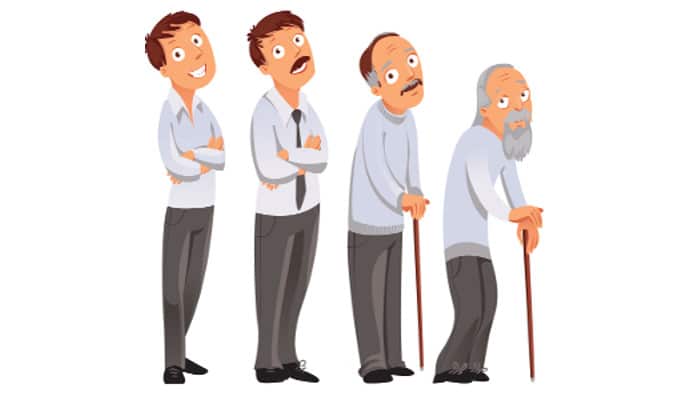
What is normal aging?
You might wonder if your older adult is aging “normally” or if there are things you should be worried about – like Alzheimer’s. Knowing about natural changes that happen to most people will help you understand the aging process and hopefully ease your mind.
Common aging changes
Age-related changes happen everywhere in the body. Here are 4 areas where you’ll be able to notice obvious changes.
1. Memory and thinking
Although the risks of Alzheimer’s increases with age, dementia is not a normal part of aging. What is normal is memory changes like being slower at remembering names and details and having less recall of short-term memories.
2. Eyes and ears
For both eyes and ears, getting older means that these senses need more input before the nerves respond. That means that it has to be brighter before the eyes can “see” the light. Or someone has to speak louder before their ears can “hear” the sound.
Around age 60, people might get cataracts, glaucoma, diabetic retinopathy, or macular degeneration. These eye problems are common in older adults. Regular eye exams with dilation can catch these conditions early. Night vision also gets worse and glare becomes a bigger problem. These changes in vision can affect seniors’ ability to drive safely, especially after dusk.
With age, hearing high-pitched sounds is more difficult. This also makes words harder to understand because consonants (like k, t, s, p) are actually high-pitched. Vowels are lower-pitched and easier to hear, but the consonants help people identify words.
DailyCaring Tip: If your older adult tells you to “stop mumbling!,” it’s because of age-related hearing loss. There’s no need to yell, just pronounce your consonants more clearly.
3. Bones and joints
Our bones and joints take a beating over the years. After 65 or more years of wear and tear, it’s natural for them to weaken, become chronically inflamed, or have cartilage get worn away. The most common age-related conditions are osteoporosis, arthritis, and rheumatoid arthritis.
The spine also becomes compressed with age because the cushions between vertebrae get thinner. This makes people seem to shrink with age. Ligaments and tendons that attach joints together lose elasticity, making joints stiff and tight. That’s why older adults are less flexible.
4. Digestion and metabolism
Digestion doesn’t usually change much because of aging. Food might move a little more slowly through the digestive system. This might cause some people to become constipated. But older people are more likely to be lactose intolerant because of changes in enzymes.
As we all know too well (argh!), metabolism slows down with age and with muscle loss. That means seniors have more body fat and less muscle. That’s why exercise is important at every age. It helps maintain or slow the decrease of muscle.
The liver doesn’t work as efficiently, which means that drugs can stick around longer in the body and have longer-lasting effects.
Next Step Signs of Normal Aging: Incontinence, Falls, Sleep, Skin
By DailyCaring Editorial Staff
Image: Senior Care Corner
Sources: NIH Medline Plus, WebMD, Merck Manuals
You might also like:
— Q & A: Why Do Seniors Shuffle When They Walk?
— Better Senior Health from Improved Doctor Visits
— Get Trusted Medicare Advice for Free
About the Author

Connie is the founder of DailyCaring.com and was a hands-on caregiver for her grandmother for 20 years. (Grandma made it to 101 years old!) She knows how challenging, overwhelming, and all-consuming caring for an older adult can be. She also understands the importance of support, especially in the form of practical solutions, valuable resources, and self-care tips.













Want to get access audio books I can read on my home computer and cell phone for no cost. I”m new at this. Thank you; Mr. Skipper……
We discuss free audiobooks from a library program in this article – Audio Books for Vision Impaired Seniors: Free Library Service https://dailycaring.com/audio-books-for-vision-impaired-seniors-free-library-service/
We also cover other sources of audiobooks here – Entertain and Engage Seniors with Books on Tape https://dailycaring.com/stimulate-senior-minds-with-books-on-tape/
[…] Fonte: dailycaring.com […]
[…] eyesight naturally declines with age, many seniors find it tiring to read on their own. Some people could have impaired vision or be […]
[…] though age itself isn’t always a good predictor of someone’s driving skill, normal age-related changes in the body can increase the risk of having an accident. Here are some of the changes to pay […]